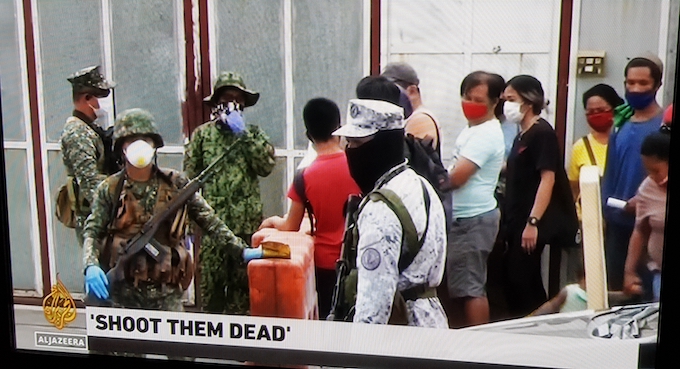PACIFIC PANDEMIC DIARY: By David Robie
A rather beautiful Guåhan legend is rather poignant in these stressed pandemic times. It is one about survival and cooperation.
In ancient times, goes the story, a giant fish was eating great chunks out of this western Pacific island. The men used muscle and might with spears and slings to try to catch it.
This didn’t work. So, the women from many villages got together while washing their hair in a river. They wove their locks into a super strong net, caught the fish and saved the island.

Now modern day Guåhan, or Guam, is the Covid-19 coronavirus epicentre in the Pacific, if we leave out the US state of Hawai’i. With the latest five more cases, Guam now has 82 infections – more than double the next worst island territory, French Polynesia with 37; there have also been three deaths so far.
For long time observers, the plight of Guam is not exactly a surprise.
– Partner –
“Epidemics or outbreaks of disease have been a persistent part of Guam’s history since first contact with Europeans,” writes local author, artist and activist Michael Lujan Bevacqua in the Pacific Daily News. “From the start of Spanish colonisation in 1668, you can provide a historical outline of Guam’s history over the next two centuries simply in terms of disease outbreaks.
“As the Spanish brought new diseases into the Marianas, their mere presence was deadly to CHamorus. As the first priests under San Vitores began to spread out across the Marianas, their arrival was often announced through microbes, with someone dying a strange and unsettling death, even prior to a priest actually visiting a village.”
Death by colonial ship
Death by epidemic always entered the territory the same way – by ship.
Although the last major outbreak happened back in 1918, writes Bevacqua, when the world was engulfed by the Spanish flu with 868 people dying locally (6 percent of the island population), some people still recall the horror.
And now Guam is host again to the worst Covid-19 outbreak in the Pacific. To make matters worse, another ship is involved with the colonial masters seeking sanctuary. The landing of almost 3000 crew members from the USS Theodore Roosevelt yesterday by Governor Lou Leon Guerrero to be quarantined in hotels ashore has been branded as a “dangerous” gamble by community leaders.
Seventy seven confirmed cases were on board with three deaths and the captain feared a disaster with the cramped quarters on board.
While the Pacific infection rates are still relatively low, many governments have been responding with panic, paranoia and creeping authoritarianism, especially in relation to freedom of information, media independence and constructive and accurate communication, so vital in these critical times.
Perhaps they are borrowing some ideas from not-so-distant neighbours in Southeast Asia. For example, the Philippines where President Rodrigo Duterte gave a controversial order to troops to “shoot dead” violators of the capital Manila’s three-week coronavirus lockdown, including those protesting for food.
Duterte’s ‘shoot them dead’ virus order to troops slammed as dangerous
Duterte’s government, intolerant of the news media at the best of times, has also cracked down on journalists. The Paris-based media freedom advocate Reporters Without Borders (RSF) has called on Philippine prosecutors to abandon all proceedings against media under a new law that is claimed to combat “false information” about the coronavirus pandemic “but in fact [it] constitutes a grave violation of press freedom”.
Two journalists face prison
Two journalists based in the southern province of Cavite – Latigo News TV website editor Mario Batuigas and video blogger and online reporter Amor Virata – are facing the possibility of two months in prison and fine of 1 million pesos (NZ$68,000) along with a local mayor as a result of charges under the new law brought by the police last weekend.
According to RSF, they are accused of spreading “false information on the Covid-19 crisis” under section 6(6) of the “Bayanihan [community] to Heal As One Act,” which President Duterte signed into law on March 25 granting himself special powers.

In Cambodia, people who violate the extensive new state of emergency powers fast-tracked into law yesterday face up to 10 years in prison, according to a draft of the pending legislation.
“The law includes 11 articles divided into five chapters and gives the government near limitless powers to repress public gatherings and free speech during times of threats to national security and public order — or in times of health crises — and gives authorities wide powers to arrest people as they deem necessary,” reports Cambojanews.
In Indonesia, President Joko Widodo’s government has pressed ahead with fast a track debate to adopt three controversial laws, including the revised Criminal Code and a weakening of the anti-corruption law, widely interpreted to collectively cement legal intolerance to dissent just at a time when the Covid-19 crisis public restrictions prevent any demonstrations.
Critics are stunned that the Parliament is determined to press ahead with this debate at the time of the health emergency that some critics have described as a “slowly-ticking coronavirus bomb nearing the point of detonation”.
Lacking public oversight
According to The Jakarta Post in an editorial: “It seems fairness is not something many of our politicians, either in the legislative and executive branches of power, believe in strongly. The deliberation of the three bills, which have met widespread opposition given to their contentious articles, will lack public oversight, which is essential.”
But as Gadjah Mada University communication lecturer Wisnu Prasetya Utomo notes in his Indonesia at Melbourne blog: “A key element of responding to the coronavirus outbreak must also involve efforts to eliminate or challenge misinformation. Minimising fear and panic as a result of hoaxes and misinformation is half the job in responding to this evolving crisis, which as yet has no end in sight.”
The Indonesian “bomb” across the border in Papua stirred an angry response in neigbouring Papua New Guinea from East Sepik Governor Allan Bird, who controversially called for a “shoot to kill” order to frontier troops against border-crossers. He later explained his views in a blog.
“This is a fight for survival. If we spend all our bullets (resources) and deploy our troops in the wrong corridor, we will lose the war,” he wrote.
“So what’s the strategy? Where should we deploy our assets to fight the virus? Where are we most vulnerable? And where can we mount our best defence? To me it’s at the entry point. Our borders… That’s the front line.
“Who do we need on the frontline? Soldiers and policemen. Well resourced. That should be 60 percent of our effort.”
Draconian rule, censorship
In Vanuatu, the caretaker government, taking cover from last month’s post-election confusion, has introduced draconian, authoritarian rule and censorship this week with the public barely noticing, as my colleague Sri Krishnamurthi revealed yesterday in Asia Pacific Report.
Vanuatu using Covid-19 to impose censorship on media, citizens
A regional media freedom advocacy group, Pacific Freedom Forum, has voiced concerns over governments taking advantage of emergency powers to impose restrictions on Pacific media. The detention and charging of two high profile Fiji citizens with breaching the Public Order Act over social media comments about Covid-19 brought the issue to a head.
The forum also noted that the Cook Islands had just passed information restrictions in its new Covid-19 legislation, levelling heavy fines and jail terms for those spreading “harmful information” over the pandemic.
“The state of emergency is not an excuse to treat newsrooms as a one-way channel to the public, or to gag dissent, social media commentary, and hard questions with restrictions and legislation,” warned Melanesia co-chair Ofani Eremae, a Solomon Islander.
As Governor Bird says, a comprehensive strategy is needed – not only for his country, but also for the Pacific region: “Burning roadside markets and beating up our women who sell food is not a smart strategy. Why is this our focus?”
Those legendary Guåhan women had the right idea: strategy, strength in unity and collaboration.
PrintDavid Robie | Radio Free (2020-04-04T03:02:07+00:00) Creeping authoritarianism in Pacific not the answer to virus pandemic. Retrieved from https://www.radiofree.org/2020/04/04/creeping-authoritarianism-in-pacific-not-the-answer-to-virus-pandemic/
Please log in to upload a file.
There are no updates yet.
Click the Upload button above to add an update.

